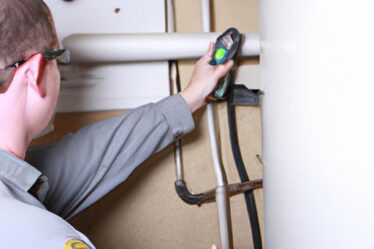Gas furnaces are essential components of many homes, providing warmth and comfort during the colder months. However, like any appliance, they can encounter issues over time. One common problem that homeowners may face is a gas furnace leaking water. This issue can be concerning and may indicate underlying issues that need to be addressed promptly.
Water leaks in gas furnaces can lead to a range of problems, from reduced efficiency to potential safety hazards. Identifying and resolving these leaks is crucial to ensure the proper functioning of your furnace and the safety of your home. In this article, we will explore the signs of a gas furnace leaking water, the possible causes of these leaks, and how to troubleshoot and prevent them effectively. Let’s delve into the world of gas furnace maintenance and address this common issue head-on.
Signs of a Gas Furnace Leaking Water
Puddles of Water
One of the most obvious signs of a gas furnace leaking water is the presence of puddles around the unit. If you notice water pooling near your furnace, it is essential to investigate the source of the leak promptly.
Rust or Corrosion
Another indicator of a water leak in your gas furnace is the presence of rust or corrosion on the unit. Water leaks can cause metal components to deteriorate over time, leading to rust formation. If you spot rust or corrosion on your furnace, it may be a sign of a water leak that needs attention.
Musty Odors
Musty or moldy odors coming from your gas furnace can also signal a water leak. Water leaks can create a damp environment that promotes mold growth, resulting in unpleasant odors. If you detect musty smells near your furnace, it is crucial to investigate the issue further to address any potential water leaks.
Causes of Water Leaks in Gas Furnaces
Condensation Buildup
Condensation buildup is a common cause of water leaks in gas furnaces. During the heating process, moisture in the air can condense on the cold surfaces of the furnace, leading to water accumulation. If the condensate drain line becomes blocked or damaged, this moisture can overflow and cause leaks.
Clogged Drain Lines
Another potential culprit for water leaks in gas furnaces is clogged drain lines. Over time, dirt, debris, and mineral deposits can accumulate in the drain lines, obstructing the flow of water. This blockage can cause water to back up and leak out of the furnace, creating a mess and potentially causing damage to the surrounding area.
Cracked Heat Exchangers
Cracked heat exchangers are a serious issue that can result in water leaks in gas furnaces. A cracked heat exchanger can allow combustion gases to escape, leading to condensation and water leaks. It is essential to address this issue promptly as it can pose a safety hazard due to the risk of carbon monoxide leaks. Identifying the root cause of water leaks in gas furnaces is crucial to prevent further damage and ensure the efficient operation of your heating system. By understanding the potential reasons behind these leaks, you can take the necessary steps to address the issue effectively and maintain the safety and functionality of your gas furnace.
How to Troubleshoot and Fix a Gas Furnace Leaking Water
Step-by-Step Guide for Inspecting and Diagnosing the Issue
When faced with a gas furnace leaking water, it is essential to follow a systematic approach to identify the root cause. Begin by checking for any visible signs of water around the furnace, such as puddles or damp areas. Next, inspect the components of the furnace, including the condensate drain lines, heat exchanger, and air filter. Look for any signs of damage, clogs, or corrosion that may be contributing to the leak.
Tips for DIY Repairs and When to Call a Professional for Help
If you feel confident in your abilities, there are some DIY steps you can take to address minor water leaks in your gas furnace. Clearing out any debris from the condensate drain lines, replacing a clogged filter, or tightening loose connections may resolve the issue. However, if the problem persists or if you are unsure about the repair process, it is best to seek the assistance of a professional HVAC technician. They have the expertise and tools to diagnose and fix the issue effectively, ensuring the safety and optimal performance of your gas furnace.
Preventing Water Leaks in Gas Furnaces
Regular Maintenance Tips
To prevent water leaks in gas furnaces, it is essential to conduct regular maintenance. This includes inspecting the unit for any signs of leaks, ensuring that all components are functioning correctly, and cleaning the furnace regularly. By keeping your gas furnace well-maintained, you can reduce the risk of water leaks and extend the lifespan of your appliance.
Importance of Annual Tune-Ups
Scheduling annual tune-ups for your gas furnace is crucial in preventing water leaks and ensuring its optimal performance. A professional HVAC technician can thoroughly inspect your furnace, clean components, check for any potential issues, and make necessary adjustments. Regular tune-ups not only help prevent water leaks but also improve the efficiency and longevity of your gas furnace. Prioritize regular maintenance to keep your furnace in good condition and avoid costly repairs in the future.
